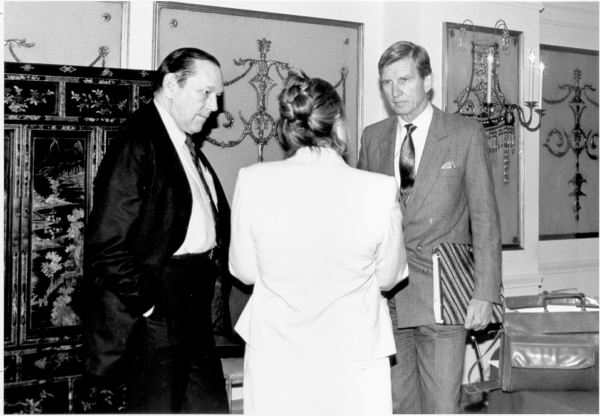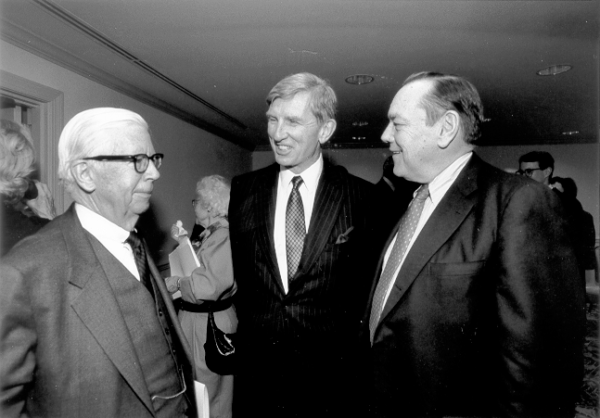Lame Excuse: Rubio Cuts Off Funding to the United Nations Population Fund (UNFPA)


The Board of Directors and staff of PAI mourn the loss of former U.S. Senator and longtime PAI Honorary Chairman and board member Joseph D. Tydings on October 8th at the age of 90.
Senator Tydings was one of the pivotal leaders in establishing the U.S. government programs which provide access to family planning and contraceptive services domestically and internationally. While his ground-breaking leadership started in the halls of Congress as a Democratic Senator from Maryland, it continued for nearly three more decades as an active member of the PAI Board of Directors until the late 1990s. This dedicated and pioneering service to the international family planning movement followed his re-election defeat in 1970.
In reviewing the early history of U.S. government involvement in domestic and international family planning, it is quite remarkable to see what Senator Tydings, together with other legislators of both parties—including then Texas Republican Congressman George H.W. Bush—were able to accomplish during the span of his single six-year term in the late 1960s.
During his brief Senate tenure from 1965 to 1971, Senator Tydings reportedly introduced no less than 15 bills to increase access to birth control in the United States and overseas. It is important to remember that only in June of 1965 had the Supreme Court legalized contraceptive use by married couples in America in its landmark ruling in Griswold v. Connecticut. Among his most notable legislative accomplishments:
In 2017, nearly 50 years later, Title X-funded clinics and health centers provided high-quality, voluntary contraceptive counseling and services, pregnancy testing, screenings for cancer and sexually-transmitted diseases and HIV/AIDS, infertility services, and other preventative health care to over 4 million patients, many of them poor and low-income women.
For his “activities related to population and birth control” in the Senate, he was the recipient of the Margaret Sanger Award for distinguished public service from Planned Parenthood-World Population in 1970.

As a private citizen, Joe Tydings remained a family planning champion and activist through his service as PAI’s Honorary Chairman and member of the Board and Executive Committee. Joe was the moving force behind early international exchanges of parliamentarians on global demographic issues, culminating in the International Conference of Parliamentarians on Population and Development in Colombo, Sri Lanka in 1979 and a series of regional parliamentary conferences in Africa, Asia, Europe, and Latin America in 1980, which helped build legislative support for donor and domestic investments in family planning and reproductive health programs in countries around the world.
Senator Tydings also remained a relentless advocate for family planning with his former colleagues in Congress. One example of his influential advocacy that stands out with great relevance to the present moment is his successful lobbying campaign with former Senator Robert Taft, Jr., Republican of Ohio and fellow long-time PAI Board member, to mitigate some of the most severe potential damage to the U.S. leadership role on population and family planning posed by the first draft of the original Mexico City Policy in 1984.
Once the draft was leaked by hardliners inside the Reagan administration to their conservative allies in Congress and the media in mid-June, Senators Taft and Tydings wrote to a bipartisan list of family planning supporters in Congress with a copy of the draft, which their letter decried “represents a 180-degree reversal in certain areas of U.S. population policy developed over a 20-year period, and is a potential foreign policy embarrassment of serious proportions.” A six-week uproar ensued in Congress and the press, including the publishing of several hundred negative news stories, editorials, and cartoons from around the country, many of which PAI helped generate.
In the end, although most of the sections of the leaked document that the Taft-Tydings letter described as devoted to advancing a “’fundamentalist, know-nothing’ political philosophy with respect to population and development in the less developed nations” remained, the abortion restrictions on U.S. government family planning assistance that the draft position paper sought to sweepingly impose on foreign governments and multilateral organizations were excised from the final version announced by the U.S. delegation at the International Conference on Population in Mexico City in August. More than 30 years later, both governments and multilaterals remain exempted from the Trump-Pence administration’s expanded version of the Global Gag Rule.
PAI celebrates the foundational and enduring contributions of Senator Joe Tydings to the global family planning and reproductive health movement and to PAI. Requiescet in pace.
We are fighting back against the onslaught of harmful policies that discard reproductive rights.
Stay informed about the issues impacting sexual and reproductive health and rights.
